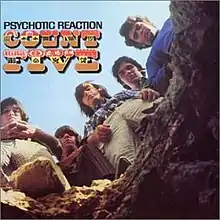| Psychotic Reaction | ||||
|---|---|---|---|---|
 | ||||
| Studio album by | ||||
| Released | October 1966 | |||
| Recorded | January 1965 and September 1966 in Hollywood, California | |||
| Genre | ||||
| Length | 24:50 | |||
| Label | Double Shot | |||
| Producer | Hal Winn, Joseph Hooven | |||
| Count Five chronology | ||||
| ||||
| Singles from Psychotic Reaction | ||||
| ||||
Psychotic Reaction is the only studio album by the American garage rock band Count Five, released in October 1966, through Double Shot Records DSS5001.
It features the hit single “Psychotic Reaction”, number five on the Billboard charts in October 1966,[2] and The Who covers, “My Generation” and "Out in the Street".
Background
Previously to recording sessions, Count Five was rejected by several record labels before they got signed to the Los Angeles-based Double Shot Records in 1965. Double Shot was an independent label (active 1965-1972) owned by Harold "Hal" Winn and Joseph "Joe" Hooven, who were also songwriters and record producers.
The song "Psychotic Reaction" was released as a single, peaking at number 5 in the U.S. charts in late 1966, after its release in July 1966. To capitalize on the success of the single, Winn and Hooven at Double Shot immediately pressured the band to record a full-length album.
The songs' lyrics were written mostly by John "Sean" Byrne, and the music and vocals were recorded in a very short time, so deliberately included two covers of The Who band as filler songs, to complete a brief album of eleven tracks. Band members complained in later interviews that due to the hurried nature of the recording sessions, they never had the chance to shape the songs the way they wanted them to sound.[3] The style of the album is fairly basic but effective, set to the rhythms and ways of garage rock.
Reception
| Review scores | |
|---|---|
| Source | Rating |
| AllMusic | |
| New Musical Express | 5/10[5] |
With a low budget production and insufficient marketing, Psychotic Reaction peaked at number 122 on the Billboard 200. Other singles, released between 1966 and 1969, sold poorly and did not chart (some not included in the original LP).
The band enjoyed limited success for a short time, dropping out of view altogether when their only hit had fallen from public memory. Accordingly, Count Five had to break up in 1969, so its members could pursue college educations.
Track listing
All songs written by John Byrne, except where noted.
- "Double-Decker Bus" – 2:00
- "Pretty Big Mouth" (Byrne/Kenn Ellner/Roy Chaney/Craig Atkinson/Mouse Michalski) – 2:07
- "The World" – 2:12
- "My Generation" (Pete Townshend) – 2:27
- "She's Fine" – 2:12
- "Psychotic Reaction" (Ellner/Chaney/Atkinson/Byrne/Michalski) – 3:03
- "Peace of Mind" (Byrne/Chaney/Michalski) – 2:19
- "They're Gonna Get You" – 2:26
- "The Morning After" – 1:57
- "Can't Get Your Lovin'" - 1:47
- "Out in the Street" (Townshend) – 2:28
Bonus tracks (only CD release)
- "Teeny Bopper, Teeny Bopper" (Ellner/Chaney/Atkinson/Byrne/Michalski) – 2:22
- "You Must Believe Me" (Curtis Mayfield) – 2:58
- "Contrast" – 3:51
- "Merry-Go-Round" – 2:37
- "Declaration of Independence" (Ellner/Chaney/Atkinson/Byrne/Michalski) – 2:20
- "Revelation in Slow Motion" (Patrick Briley) – 1:57
- "Mailman" (Mighty Mo Rodgers/Winn) – 2:22
Personnel
Musicians
- John "Sean" Byrne - lead vocals, rhythm guitar
- Kenn Ellner – lead vocals (tracks 4, 8, and 11), tambourine, harmonica
- John "Mouse" Michalski – lead guitar
- Craig "Butch" Atkinson – drums
- Roy Chaney – bass guitar
Technical
- Hal Winn – producer
- Joseph Hooven – producer
- Sy Mitchell – engineer
- Bernard Yeszin – photography, design
- Irwin Zucker – promotions director
Charts
Albums
| Chart (1966) | Peak position |
|---|---|
| US Top LPs (Billboard)[6] | 122 |
Singles
| Year | Single | US Hot 100 |
|---|---|---|
| 1966 | "Psychotic Reaction"[7] | 5 |
| "Peace of Mind"[8] | 125 | |
References
- ↑ Fleming, Colin (June 3, 2016). "10 Wild LPs From Garage Rock's Greatest Year". Rolling Stone. Retrieved November 4, 2016.
- ↑ Cost, Jud (1994). Count Five: liner notes to Psychotic Reaction CD. New Jersey, Performance Records.
- ↑ Kesteloo, Hans. "BEYOND THE BEAT GENERATION - THE COUNT FIVE Interview". Home.unet.nl. Retrieved 28 July 2018.
- ↑ Stewart Mason. "Psychotic Reaction". AllMusic. Retrieved 11 March 2012.
- ↑ Quantick, David (7 November 1987). "Count Five: Psychotic Reaction / Pretty Things: SF Sorrow". New Musical Express. p. 32.
- ↑ "Count Five Chart History: Billboard 200". Billboard. Retrieved November 22, 2021.
- ↑ "Count Five Chart History: Billboard Hot 100". Billboard. Retrieved November 22, 2021.
- ↑ "The Count Five Top Songs". Musicvf. Retrieved November 22, 2021.